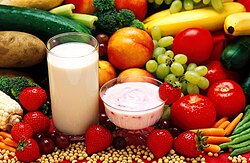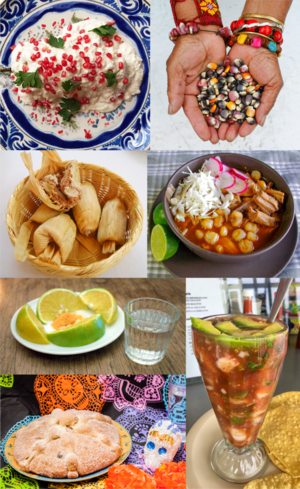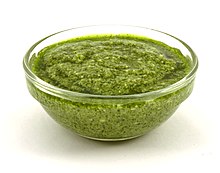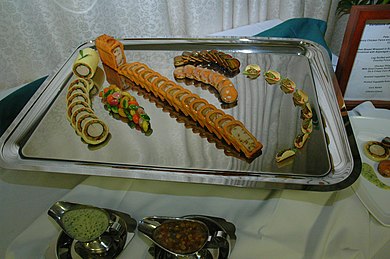Portal:Food
F o o d
A portal dedicated to food and foodways
Introduction


Food is any substance consumed by an organism for nutritional support. Food is usually of plant, animal, or fungal origin and contains essential nutrients such as carbohydrates, fats, proteins, vitamins, or minerals. The substance is ingested by an organism and assimilated by the organism's cells to provide energy, maintain life, or stimulate growth. Different species of animals have different feeding behaviours that satisfy the needs of their metabolisms and have evolved to fill a specific ecological niche within specific geographical contexts.
Omnivorous humans are highly adaptable and have adapted to obtain food in many different ecosystems. Humans generally use cooking to prepare food for consumption. The majority of the food energy required is supplied by the industrial food industry, which produces food through intensive agriculture and distributes it through complex food processing and food distribution systems. This system of conventional agriculture relies heavily on fossil fuels, which means that the food and agricultural systems are one of the major contributors to climate change, accounting for as much as 37% of total greenhouse gas emissions. (Full article...)
Cooking, also known as cookery or professionally as the culinary arts, is the art, science and craft of using heat to make food more palatable, digestible, nutritious, or safe. Cooking techniques and ingredients vary widely, from grilling food over an open fire, to using electric stoves, to baking in various types of ovens, reflecting local conditions. Cooking is an aspect of all human societies and a cultural universal.
Preparing food with heat or fire is an activity unique to humans. Archeological evidence of cooking fires from at least 300,000 years ago exists, but some estimate that humans started cooking up to 2 million years ago.
The expansion of agriculture, commerce, trade, and transportation between civilizations in different regions offered cooks many new ingredients. New inventions and technologies, such as the invention of pottery for holding and boiling of water, expanded cooking techniques. Some modern cooks apply advanced scientific techniques to food preparation to further enhance the flavor of the dish served. (Full article...)
Danish Bacon was a brand under which Danish bacon was sold in the United Kingdom. The product had "Danish" stamped on the rind between wavy lines. The Danish farmers producing Danish Bacon and their co-operatives were represented by Danske Slagterier, whose UK subsidiary was the Danish Bacon and Meat Council. Danske Slagterier was absorbed into a Danish agricultural umbrella organisation in 2009. The majority of Danish bacon is produced through the farmer-owned co-operative Danish Crown. The co-operative system has low costs because of the scale (25 million pigs per year) and the elimination of the need for markets. Most of the production is for export.
Danish pig exports started to the UK in the mid-19th century when exporting to Germany became difficult and have grown ever since despite attempts by UK domestic producers and other importers to compete. They have not been able to keep pace with Danish modernisation of the curing process and increasing centralisation. (Full article...)
Selected article –

Vegetarianism is the practice of abstaining from the consumption of meat (red meat, poultry, seafood, insects, and the flesh of any other animal). It may also include abstaining from eating all by-products of animal slaughter.
Vegetarianism may be adopted for various reasons. Many people object to eating meat out of respect for sentient animal life. Such ethical motivations have been codified under various religious beliefs as well as animal rights advocacy. Other motivations for vegetarianism are health-related, political, environmental, cultural, aesthetic, economic, taste-related, or relate to other personal preferences. (Full article...)Selected cuisine -

Mexican cuisine consists of the cooking cuisines and traditions of the modern country of Mexico. Its earliest roots lie in Mesoamerican cuisine. Its ingredients and methods begin with the first agricultural communities such as the Olmec and Maya who domesticated maize, created the standard process of nixtamalization, and established their foodways. Successive waves of other Mesoamerican groups brought with them their cooking methods. These included: the Teotihuacanos, Toltec, Huastec, Zapotec, Mixtec, Otomi, Purépecha, Totonac, Mazatec, Mazahua, and Nahua. With the Mexica formation of the multi-ethnic Triple Alliance (Aztec Empire), culinary foodways became infused (Aztec cuisine).
Today's food staples native to the land include corn (maize), turkey, beans, squash, amaranth, chia, avocados, tomatoes, tomatillos, cacao, vanilla, agave, spirulina, sweet potato, cactus, and chili pepper. Its history over the centuries has resulted in regional cuisines based on local conditions, including Baja Med, Chiapas, Veracruz, Oaxacan, and the American cuisines of New Mexican and Tex-Mex. (Full article...)Selected ingredient –

A mirepoix (/mɪərˈpwɑː/ meer-PWAH, French: [miʁ.pwa]) is a mixture of diced vegetables cooked with fat (usually butter) for a long time on low heat without coloring or browning. The ingredients are not sautéed or otherwise hard-cooked, because the intention is to sweeten rather than caramelize them. Mirepoix is a long-standing part of French cuisine and is the flavor base for a wide variety of dishes, including stocks, soups, stews, and sauces.
When the mirepoix is not precooked, the constituent vegetables may be cut to a larger size, depending on the overall cooking time for the dish. Usually the vegetable mixture is onions, carrots, and celery (either common 'Pascal' celery or celeriac), with the traditional ratio being 2:1:1—two parts onion, one part carrot, and one part celery. Further cooking, with the addition of tomato purée, creates a darkened brown mixture called pinçage. (Full article...)
Selected recipe –

Pesto (Italian: [ˈpesto]) or more fully pesto alla genovese (Italian: [ˈpesto alla dʒenoˈveːse, -eːze]; lit. 'Genoese pesto') is a paste made of crushed garlic, pine nuts, salt, basil leaves, grated cheese such as Parmesan or pecorino sardo, and olive oil. It originated in the Italian city of Genoa, and is used to dress pasta and sometimes soups. (Full article...)
Everything Tastes Better with Bacon: 70 Fabulous Recipes for Every Meal of the Day is a book about cooking with bacon written by author, food commentator and The Oregonian columnist Sara Perry. The book was published in the United States on May 1, 2002, by Chronicle Books, and in a French language edition in 2004 by Les Éditions de l'Homme in Montreal. In it, Perry describes her original concept of recipes combining sugar and bacon. Her book includes recipes for bacon-flavored dishes and desserts.
The book received mainly positive reviews and its recipes were selected for inclusion in The Best American Recipes 2003–2004. The St. Petersburg Times classed it as among the "most interesting and unique cookbooks" published, the Pittsburgh Post-Gazette highlighted it in the article "Favorite Cookbooks for 2002" and The Denver Post included it in a list of best cookbooks of 2002. A review in the Toronto Star criticized Perry's lack of creativity in her choice of recipes. Recipes from the work have been featured in related cookbooks. (Full article...)Selected image –
Selected biography –

B. June 25, 1956 – d. June 8, 2018
Anthony Michael Bourdain (/bɔːrˈdeɪn/; June 25, 1956 – June 8, 2018) was an American celebrity chef, author, and travel documentarian. He starred in programs focusing on the exploration of international culture, cuisine, and the human condition.
Bourdain was a 1978 graduate of The Culinary Institute of America and a veteran of many professional kitchens during his career, which included several years spent as an executive chef at Brasserie Les Halles, in Manhattan. He first became known for his bestselling book Kitchen Confidential: Adventures in the Culinary Underbelly (2000). (Full article...)
Did you know (auto-generated) –

- ... that strawberry pie is one of the "red foods" traditionally served at Juneteenth celebrations?
- ... that an investigation found that most Mexican nutrition science students could not interpret a nutritional front-of-package labeling system correctly?
- ... that Ice Spice is Princess Diana?
- ... that some fans of Genshin Impact have referred to the character Paimon as "emergency food"?
- ... that in countries like the United States, prisoners supplement inadequate prison food by combining ingredients like instant ramen, mayonnaise and Kool-Aid into improvised meals called "spreads"?
- ... that food critic Grace Dent reviewed a Liverpool restaurant that served her rice pudding flavoured with a substance that is banned in the United States for its lethality?
More did you know –
Related portals
Food topics
The following are topics relating to food
Categories
Food list articles
- See also: Lists of foods and Category:Lists of drinks
The following are some Food list articles on Wikipedia:

- American cheeses
- Appellation d'Origine Contrôlée cheeses
- Apple cultivars
- Bacon dishes
- Bacon substitutes
- Basil cultivars
- Breads
- Breakfast beverages
- Breakfast cereals
- Breakfast foods
- British cheeses
- Cakes
- Candies
- Cheeses
- Cheese soups
- Christmas dishes (list)
- Cocktails
- Cookies
- Dishes using coconut milk
- Diets
- Doughnut varieties
- Egg dishes
- Fermented soy products
- Food additives
- Food additives (Codex Alimentarius)
- Foods named after people
- French cheeses
- French dishes
- Fried dough foods
- Fruits
- List of hamburgers
- Herbs and spices
- Hors d'oeuvre
- Indian dishes
- Indian snack foods
- Indonesian dishes
- Italian dishes
- Japanese snacks
- Japanese dishes
- Jewish dishes
- Kebabs
- Korean beverages
- Mango cultivars
- Moroccan dishes
- Pasta
- Pastries
- Philippine snack food
- Pies, tarts and flans
- Poppy seed pastries and dishes
- Potato dishes
- Puddings
- Raw fish dishes
- Rice dishes
- Rolled foods
- Sauces
- Seafood
- Seeds
- Sandwiches
- Snack foods
- Soft drinks by country
- Soul foods and dishes
- Soups
- Stews
- Street foods
- Tapas
- Turkish dishes
- Twice-baked foods
- Vegetable oils
- Vegetables
- Vodkas
Things you can do
Related WikiProjects
| Parent project: WikiProject Food and Drink | |
| Child projects: | Task forces: (All inactive) |
|
|
| Related projects: | |
New articles
Rules | Match log | Results page (for watching) | Last updated: 2024-06-04 19:24 (UTC)
Note: The list display can now be customized by each user. See List display personalization for details.
- The Captive of the Sahara (edit | talk | history | links | watch | logs | tools) by Lord Cornwallis (talk · contribs · new pages (47)) started on 2024-06-04, score: 10
- Apple bread (edit | talk | history | links | watch | logs | tools) by Heeheemalu (talk · contribs · new pages (9)) started on 2024-06-04, score: 20
- Chiang Yu-An (edit | talk | history | links | watch | logs | tools) by BemrXDD (talk · contribs · new pages (3)) started on 2024-06-03, score: 10
- John Greene (Nurse) (edit | talk | history | links | watch | logs | tools) by Sue8183 (talk · contribs · new pages (1)) started on 2024-06-03, score: 40
- Red Boat (edit | talk | history | links | watch | logs | tools) by Valereee (talk · contribs · new pages (2)) started on 2024-06-02, score: 10
- Agrosuper (edit | talk | history | links | watch | logs | tools) by FrederickEvans (talk · contribs · new pages (27)) started on 2024-06-02, score: 30
- Fowler Ltd. (edit | talk | history | links | watch | logs | tools) by EssNS (talk · contribs · new pages (26)) started on 2024-06-01, score: 10
- Nilla Wafers (edit | talk | history | links | watch | logs | tools) by Voorts (talk · contribs · new pages (46)) started on 2024-05-26, score: 10
- Solari's (edit | talk | history | links | watch | logs | tools) by Nolabob (talk · contribs · new pages (1)) started on 2024-06-01, score: 20
- Nasi katok (edit | talk | history | links | watch | logs | tools) by The Bangsawan (talk · contribs · new pages (13)) started on 2024-06-01, score: 20
- Justin Sterner (edit | talk | history | links | watch | logs | tools) by Muboshgu (talk · contribs · new pages (14)) started on 2024-05-31, score: 10
- Warankasi (edit | talk | history | links | watch | logs | tools) by Wiisstlo (talk · contribs · new pages (5)) started on 2024-05-26, score: 20
- Brennans Bread (edit | talk | history | links | watch | logs | tools) by Gatepainter (talk · contribs · new pages (3)) started on 2024-05-31, score: 20
- Karin-Lis Svarre (edit | talk | history | links | watch | logs | tools) by Ipigott (talk · contribs · new pages (10)) started on 2024-05-31, score: 10
- Indori poha (edit | talk | history | links | watch | logs | tools) by Apocheir (talk · contribs · new pages (5)) started on 2024-05-30, score: 20
- Tanuki (restaurant) (edit | talk | history | links | watch | logs | tools) by Another Believer (talk · contribs · new pages (105)) started on 2024-05-30, score: 10
- Lena Ice Cream (edit | talk | history | links | watch | logs | tools) by Syazwi Irfan (talk · contribs · new pages (3)) started on 2024-05-23, score: 30
- Ko Myeong-seok (edit | talk | history | links | watch | logs | tools) by Explicit (talk · contribs · new pages (3)) started on 2024-05-30, score: 10
- Savanyúság (edit | talk | history | links | watch | logs | tools) by Konnor Martin (talk · contribs · new pages (1)) started on 2024-05-29, score: 10
- Laal maas (edit | talk | history | links | watch | logs | tools) by SafariScribe (talk · contribs · new pages (151)) started on 2024-05-29, score: 30
- Furrundu (edit | talk | history | links | watch | logs | tools) by BaduFerreira (talk · contribs · new pages (3)) started on 2024-05-29, score: 50
- Hyman's Seafood (edit | talk | history | links | watch | logs | tools) by DMVHistorian (talk · contribs · new pages (5)) started on 2024-05-28, score: 10
- Pickup Coffee (edit | talk | history | links | watch | logs | tools) by Hariboneagle927 (talk · contribs · new pages (21)) started on 2024-05-28, score: 20
- Geoffrey Hawtin (edit | talk | history | links | watch | logs | tools) by Chromista (talk · contribs · new pages (1)) started on 2024-05-28, score: 10
- Palani Panchamirtham (edit | talk | history | links | watch | logs | tools) by Magentic Manifestations (talk · contribs · new pages (14)) started on 2024-05-27, score: 10
- Erismatopterus (edit | talk | history | links | watch | logs | tools) by Kevmin (talk · contribs · new pages (20)) started on 2024-05-27, score: 10
- Saskatoon berry pie (edit | talk | history | links | watch | logs | tools) by Reywas92 (talk · contribs · new pages (2)) started on 2024-05-27, score: 30
- Zus Coffee (edit | talk | history | links | watch | logs | tools) by Hariboneagle927 (talk · contribs · new pages (21)) started on 2024-05-27, score: 20
- Space Cola Wars (edit | talk | history | links | watch | logs | tools) by Artem.G (talk · contribs · new pages (14)) started on 2024-05-27, score: 10
- Conchas de Piedra (edit | talk | history | links | watch | logs | tools) by Another Believer (talk · contribs · new pages (105)) started on 2024-05-27, score: 10
- Torta Balcarce (edit | talk | history | links | watch | logs | tools) by Murmuring Rock (talk · contribs · new pages (4)) started on 2024-05-25, score: 20
- Bilal Yalcinkaya (edit | talk | history | links | watch | logs | tools) by Das osmnezz (talk · contribs · new pages (35)) started on 2024-05-23, score: 10
- Andok's (edit | talk | history | links | watch | logs | tools) by Karich28 (talk · contribs · new pages (4)) started on 2024-05-22, score: 20
- Doe Donuts (edit | talk | history | links | watch | logs | tools) by Another Believer (talk · contribs · new pages (105)) started on 2024-05-23, score: 10
- I, the Executioner (2024 film) (edit | talk | history | links | watch | logs | tools) by Οἶδα (talk · contribs · new pages (70)) started on 2024-05-21, score: 10
- Virginia Sole-Smith (edit | talk | history | links | watch | logs | tools) by Marquardtika (talk · contribs · new pages (1)) started on 2024-05-22, score: 10
- Lohusa şerbeti (edit | talk | history | links | watch | logs | tools) by Macrakis (talk · contribs · new pages (8)) started on 2024-05-22, score: 30
- I, the Executioner (edit | talk | history | links | watch | logs | tools) by Οἶδα (talk · contribs · new pages (70)) started on 2024-05-21, score: 10
- Paul Parkman (edit | talk | history | links | watch | logs | tools) by Thriley (talk · contribs · new pages (76)) started on 2024-05-21, score: 10
- Two Roosters Ice Cream (edit | talk | history | links | watch | logs | tools) by Johnson524 (talk · contribs · new pages (3)) started on 2024-05-21, score: 10
- There Be Monsters (edit | talk | history | links | watch | logs | tools) by Another Believer (talk · contribs · new pages (105)) started on 2024-05-21, score: 10
- Chinir saaj (edit | talk | history | links | watch | logs | tools) by Moriwen (talk · contribs · new pages (264)) started on 2024-05-21, score: 30
- Doogh (edit | talk | history | links | watch | logs | tools) by MuhammedBenShalom (talk · contribs · new pages (1)) started on 2024-05-21, score: 20
- Sata physic gardens (edit | talk | history | links | watch | logs | tools) by MChew (talk · contribs · new pages (18)) started on 2024-05-21, score: 10
- Khanom Med Khanoon (edit | talk | history | links | watch | logs | tools) by Quantplinus (talk · contribs · new pages (0)) started on 2024-05-18, score: 10
Associated Wikimedia
The following Wikimedia Foundation sister projects provide more on this subject:
-
Commons
Free media repository -
Wikibooks
Free textbooks and manuals -
Wikidata
Free knowledge base -
Wikinews
Free-content news -
Wikiquote
Collection of quotations -
Wikisource
Free-content library -
Wikiversity
Free learning tools -
Wiktionary
Dictionary and thesaurus













































